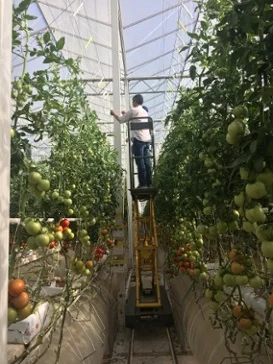Jonathan Feist of Motorleaf outlines how machine learning can help cultivators operate in the most efficient and effective ways possible.

The following is an article produced by a contributing author. Growers Network does not endorse nor evaluate the claims of our contributors, nor do they influence our editorial process. We thank our contributors for their time and effort so we can continue our exclusive Growers Spotlight service.
Disclaimer
This article was originally published on Motorleaf's blog. If you would like to read the original article, click here.
How does artificial intelligence and machine learning in agriculture work, exactly?
AI can be simply described as software that can automate manual tasks on the fly. For example, in the case of self-driving cars, software is written to drive a car through traffic without human intervention. This software is designed to instruct machines to brake or turn when an obstacle presents itself, and all this without an actual driver. “But part of that system’s goal is to create a reality in which the self-driving car actually performs better than a human driver,” says Motorleaf’s AI Director Scott Dickson Dagondon, “and with agriculture, we’re looking for the same thing: not just to come up with something to automate human tasks, but rather to improve upon them.”
It is in this spirit that Motorleaf has been using machine learning and artificial intelligence for vegetable yield predictions improvements and optimization.

“We have a solid understanding of the inputs that go into yield prediction today, for different crops, and we’ve designed features that can adapt to different changes in environment,” says Dagondon. “We are at the point now where we have an algorithm that can predict yields weeks in advance in greenhouses over 60 acres in size, and we’re scaling up to more and more locations.”
Looking Ahead
“Since there are no standards in agriculture to compare to, it’s hard to tell when algorithms are precise enough,” says Dagondon. For example, a yield predictive algorithm that works in one specific greenhouse does not necessarily translate to another data set and environment, which makes algorithm training and learning processes more difficult.
But this isn’t necessarily a bad thing, thinks Dagondon, as developing an algorithm also builds human expertise. "We’re learning how to farm while looking at numbers, and we begin to understand what the plants need through the data," he says. There are a number of challenges that present themselves when designing machine learning algorithms for greenhouses:
- Geographical locations
- Changing weather patterns
- Varied farming equipment
All of these factors contribute to the difficulty of standardization. By nature, plants are inherently complex organisms, and agricultural environments are unpredictable. If you’ve ever relied on weather predictions for your next camping trip, you’ll understand.
This is all fairly novel technology, especially in the agricultural space. “A lot of people use AI as a buzzword, or maybe are skeptical,” jokes Dagondon, “they’re worried that it will replace farmers and eradicate labour.” The reality is the opposite: no company is directly building machines specifically to eliminate farmers. “There are huge costs involved from transitioning from conveyors and tractors to indoor farms and robots, and there isn’t an unlimited capital availability to make that switch,” says Dagondon.
Still, Dagondon is confident in a solid foundation to build upon. One of the challenges of machine learning is determining when a result is satisfactory, and Motorleaf is hopeful to see how close it can get to perfect yield predictions.
Get in touch if you'd like to know more about in-depth, data-driven insights into the way your crops are growing.
10 Best Gift Ideas for Cannabis Connoisseurs and Growing Aficionados (2022)
December 7, 2022Developing and Optimizing a Cannabis Cultivation System
December 14, 2021Dealing with Insomnia: How Can CBD Help?
December 10, 2020Your Guide to Sleep and CBD
December 7, 2020
Do you want to receive the next Grower's Spotlight as soon as it's available? Sign up below!
Resources:
Want to get in touch with Motorleaf? They can be reached via the following methods:
- Website: http://info.motorleaf.com/contact-us
- Email: info@motorleaf.com

Do you have any questions or comments?

About the Author
Jonathan Feist is the Business Development Manager at Motorleaf.